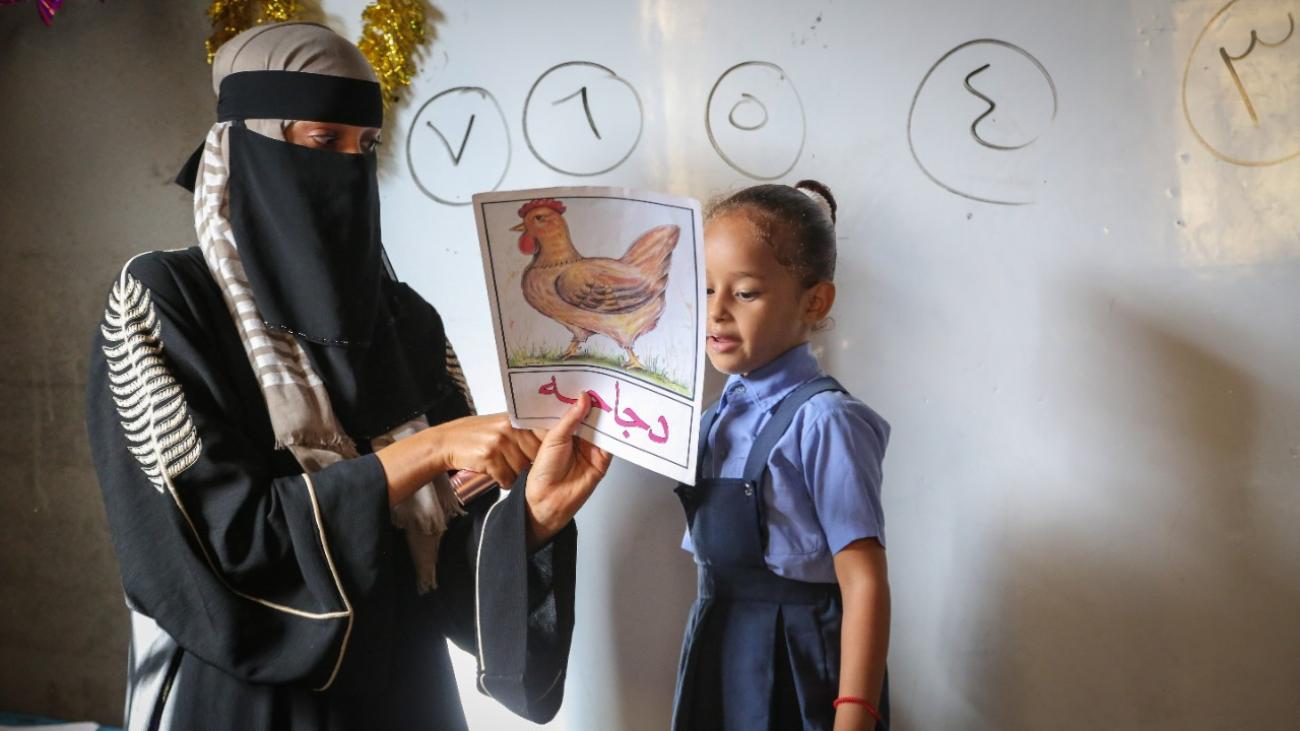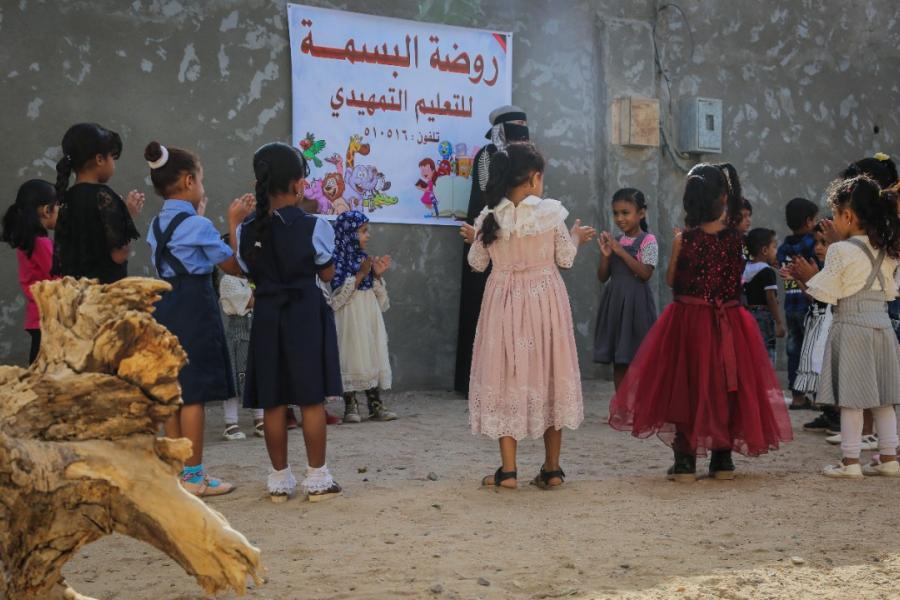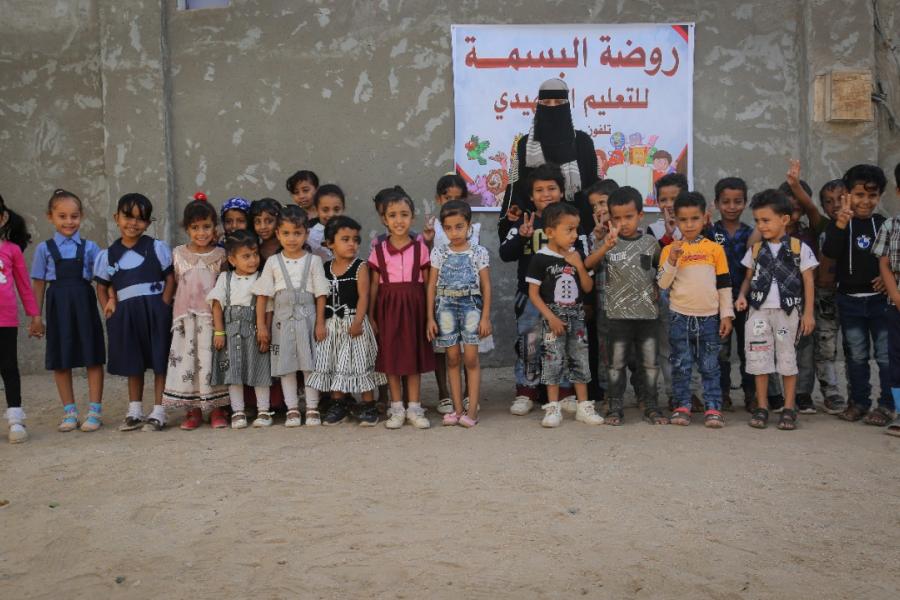The Five Pillars of Success: Salwa’s Story

In a small house filled with preschool-aged children playing joyfully, we met Salwa. A 32-year-old self-made community leader from Lahj in southern Yemen.
Salwa wants to share her story and encourage others to dream big, just like she did. These are her five pillars of success.
Pillar One: Find Your Calling
“At the time my soul was aching from my inability to complete my education. The need to work and help others grew bigger and bigger inside me,” says Salwa.
Living with her parents, four brothers and two sisters, Salwa was unable to go to university because of the family's difficult financial situation. Her father was earning less than US$ 100 a month - income the family was dependent on.
Salwa would spend her days caring for her mother, who lives with a disability, and teaching neighbourhood children how to read and write. It was doing this work, that Salwa was able to discover her true potential.
“Undeniably, the desire to help these children improve their education was what sparked my drive, and the opportunity to do it while generating income,” Salwa explains. “Women should know how much intellectual and practical wealth they have within themselves.”

Pillar Two: Find A Mentor and Plan Your Business
In 2021, Salwa learned about a joint initiative by CARE International and the United Nations Development Programme (UNDP) aiming to help Yemenis create sustainable livelihood opportunities.
Salwa had always been both passionate about education and motivated to improve the living conditions for her and her family. She was selected as a participant.
“I was enrolled in a six-day training,” says Salwa. “The training was held via WhatsApp to keep us safe during the COVID-19 pandemic, but it was very useful. We learned how to run an enterprise, including managing finances - profits and sales.”
“The most important thing I learned was the potential social impact of an enterprise for the community,” she says. “I was thinking of starting a more profitable business such as engraving, but after the training I decided to follow my passion and open a kindergarten to teach young children. The trainer’s valuable feedback helped me to shape my business idea and plan.”
Pillar Three: Convince Others of Your Vision
A lack of available financial support is one of the biggest challenges hindering women entrepreneurs in Yemen. To maximise fundraising opportunities, Salwa and other trainees were trained in drafting a business plan and encouraged to submit it for funding. Convinced of her vision, Salwa was selected to receive a financial grant through UNDP and CARE’s joint project.
“I was extremely happy the moment I found out I was one of the grant winners,” describes Salwa. “I received a cash grant of 336,000 YER (approximately US$ 600) and went home quickly to tell my family. We were so excited we directly went to the city and bought whiteboards, tables, chairs and other teaching tools for the kindergarten.”
“42 students have registered. I charge 4,000 YER for each student, earning a monthly income of 168,000 YER (approximately US$ 280),” she explains.

Pillar Four: Surround Yourself with Supportive People
Small business owners need a lot of support to succeed, whether it's financial, operational, or emotional.
“Thankfully, my family’s support is unlimited,” exclaims Salwa. “My sister helps me look after the students, and I’m always grateful for my mother’s constant well wishes – not to mention my father’s strength as he stands by my side.”
“My daughter wanted to open a kindergarten at the house. I didn't object, rather I felt proud and supported her,” explains Mohammed, Salwa’s father.
Pillar Five: Constantly Evolve
“It has been nearly seventeen years since I started teaching children in a small living room at my parents’ house, I never lost my passion for teaching though.” she reflects. "This project has served the people in my area as well as my family - we finally have an income that helps us to live better.”
Passion, dedication, and hard work, in addition to the support of UNDP and CARE International – through the Supporting Resilient Livelihoods and Food Security in Yemen joint Programme (ERRY II) – helped Salwa to demonstrate the benefit of local education to her neighbours. Now children from her community are able to gain critical skills in a peaceful learning environment through fun modern teaching methods.
“Sometimes my daughter refuses to go back home and prefers to stay in the kindergarten,” says one mother. “I feel safe sending my children here and go to work with no worries. Salwa taught my son and daughter a long time ago; they are now at college,” says one of Salwa’s women neighbours.
“I feel proud that I transformed my personal passion into a successful business. I hope to expand the kindergarten in a bigger building and teach more students,” she concludes.
***
These activities were implemented as a part of the Supporting Resilient Livelihoods and Food Security in Yemen Joint Programme (ERRYJP II) in partnership with CARE International, Oxfam, Sustainable Development Foundation, Youth Leadership Development Foundation, Millenium
Development Foundation and For All Foundation. The Programme aims to strengthen the resilience capacity of crisis-affected communities through the creation of sustainable livelihoods and access to basic services.





